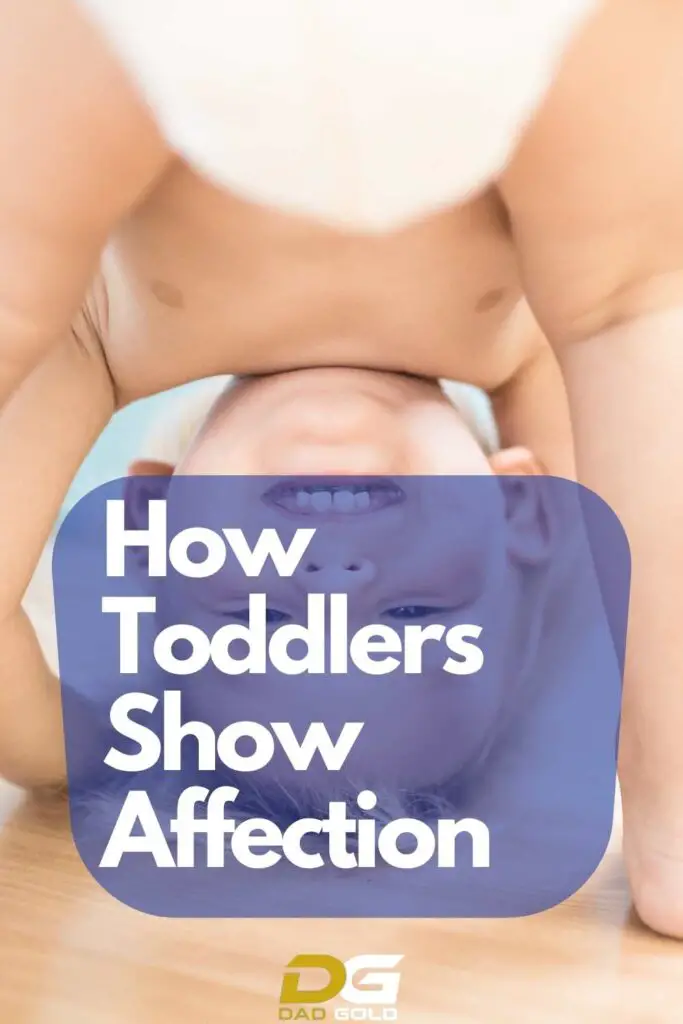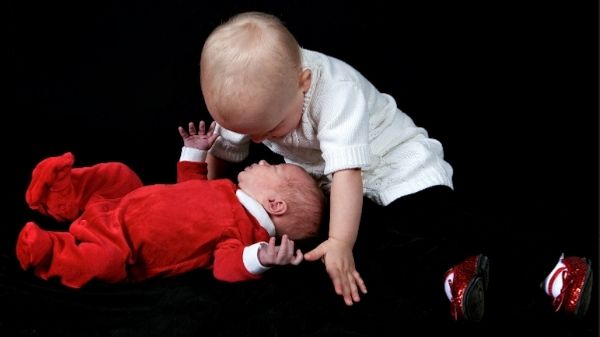Raising a child is one of the most rewarding and challenging things you can do in life.
However, among the greatest mysteries is sorting out what your child is trying to tell you as they move from infant to toddler and up through adolescence. They are, after all, just figuring out how to communicate.
The first big, noticeable change occurs when your child grows out of infancy and moves into toddlerhood.
It’s hard, sometimes, to know how to interpret your toddler’s expressions of affection.
My son, for instance, goes from a hug straight to barking manically in my face. I think (hope) that is a sign of affection!
Here are some common affectionate signs that your toddler might be giving you…

When does an infant become a toddler?

Children are individuals and can develop at different paces, but generally, ages 1 (12 months old) through 3 are considered toddlerhood. This is an important period when your child will experience much social, emotional, and intellectual development.
-

Bold Male Pride – Baseball Trucker Cap Celebrating Masculinity
£18.00 Select options This product has multiple variants. The options may be chosen on the product page -

Dad Bod Appreciation Gift Mug
£14.00 Add to cart -

Dad Bod, Bad Jokes Structured Baseball Cap
£22.00 Select options This product has multiple variants. The options may be chosen on the product page
While your toddler might not say “I love you” until age 2 or 3, there are many other ways to communicate affection. Remember – your toddler hasn’t mastered vocalizing, so most communication is physical.
How does your toddler show you affection?

Your toddler will express affection in many ways that will make for precious photos and warm memories. Here are a few of them that we can easily envision from those days as a newborn.
- Cuddling. When your toddler snuggles, they say that they take comfort in your arms. A hug is the most common activity for your child to show physical affection towards their parents.
- Show and Tell. Your toddler will be eager to share with you everything they learn to make you a part of their life while showing you love and demonstrating how much they trust you.
- Sharing. Toddlers often like to share treats and food with you, demonstrating a willingness to sacrifice and show love. We all know how much kids hate to share… so if your little one is happy to hand something over, then it increases the positivity, right?
- Art. Your toddler will happily give you their scribbles and crayon masterpieces to share something that they created with a parent or loved one.
- Favorites. It’s typical for toddlers to be very attached to an object – a blanket, a stuffed animal, a doll, for instance – and to want to carry it with them almost everywhere because it represents you and keeps you close to them even when they’re away from you or their familiar surroundings.
- Greetings. You are the center of your toddler’s universe, and so when you go away for any reason, it’s a moment of great joy when you return. Screaming and rushing into your arms are ways to express joy and happiness. It’s also a great relief because you’ve returned, reinforcing their confidence in your trustworthiness and reliability.
- Rituals. Toddlers are struggling to make sense of the world, so they like things to be orderly. Engaging in rituals and routines helps them set their compasses while reinforcing their relationship with you.
What your little one might do to surprise you

Toddlers also express affection for you in ways you might not initially understand as signs of their love. Here are a few of them. (Once you get used to these, they’ll also provide wonderful memories and maybe a few good laughs.)
- Dawdling. Inexperienced parents might find it frustrating when toddlers seem completely disinterested in getting from Point A to Point B and are easily distracted by the slightest thing. They’re usually just stalling to make sure that they have more of your undivided attention. They love being with you, so going places and doing things can be unnerving.
- Running away from you. Toddlers love to run away, so you have to chase them to catch them. This serves two purposes in your child’s development. First, it’s a way to try being a little independent. Second – and perhaps more importantly – it’s a way of gaining reassurance that you’re a reliable, secure person who will always be there no matter what. No wonder this game is usually punctuated with delightful giggles.
- Food messes. This is a time of great curiosity and learning, and food provides a full curriculum because of the various textures, colors, and flavors. Mashing it, plastering it on their faces or heads, or even throwing it is a wonderful way to explore and learn. Sharing the messy discoveries with you is another sign of love and affection.
Can a toddler be too affectionate and show you too much love?

No. Your toddler is learning how to express affection but hasn’t yet developed the language or social skills. Everything is an experiment and usually a form of imitation. Your toddler will attempt to mimic what they see people do in real life or perhaps on television.
Sometimes parents worry that an “overly affectionate” toddler shows signs of insecurity. Not to worry – toddlers imitate what they see and haven’t yet learned about boundaries. So, don’t worry about prolonged, sloppy kisses or what would be inappropriate touching by an older child. As your child understands more and matures, you can discuss boundaries. That will stop your toddler from being overly attached to mom or dad.
What if your toddler resists your affection?
Don’t be heartbroken or take it personally if your toddler acts as though they don’t want your affection, even if it seems that your toddler doesn’t like you.
Kids are different, and yours might just be showing a bit of an independent streak. There are things you can do, however. Here are a few:
- Please pay attention to your toddler to figure out how they like you to show affection. Some little kids like to cuddle or be kissed, while others like to roughhouse a bit. Toddlers are affectionate, so you have to figure out how yours likes to have affection shown.
- Pick your spots. Sometimes a toddler doesn’t want affection. Other times they do. It’s not you. They love you but don’t always want to be smothered.
- Know when is enough. If your toddler accepts your affection but then wants to wiggle away, that’s okay. Let them break away when they want.
- Don’t get upset. It’s tempting to lay on the guilt or get upset. Be confident that your toddler loves you in their own way and in their own time.
- Keep trying, but don’t force it. Your toddler craves affection and will come around.
Wrapping up
Your little one will have a different way of showing you affection; you just need to figure out what that is!
Whilst this page gives you some of the common (and not so common) ways your little one shows love, not all kids behave in the same way, but you know that already, right?
The important thing is that you show your toddler the affection they need to grow into a confident, happy person!
Good luck!
References
https://www.parents.com/toddlers-preschoolers/development/language/9-ways-toddlers-say-i-love-you/
https://www.whattoexpect.com/toddler/behavior/resisting-affection.aspx
https://www.cdc.gov/ncbddd/childdevelopment/positiveparenting/toddlers.html




